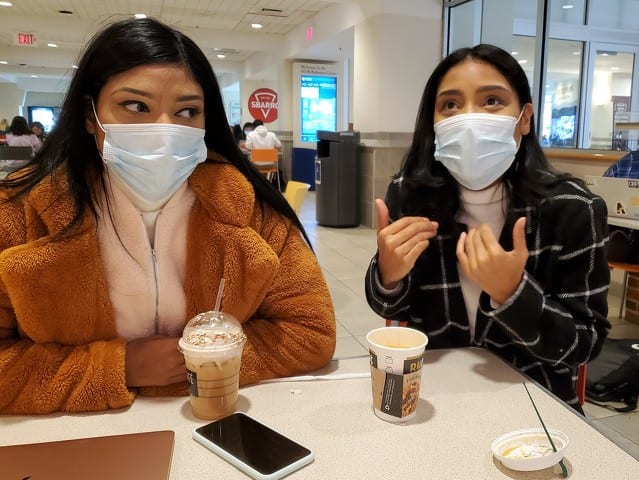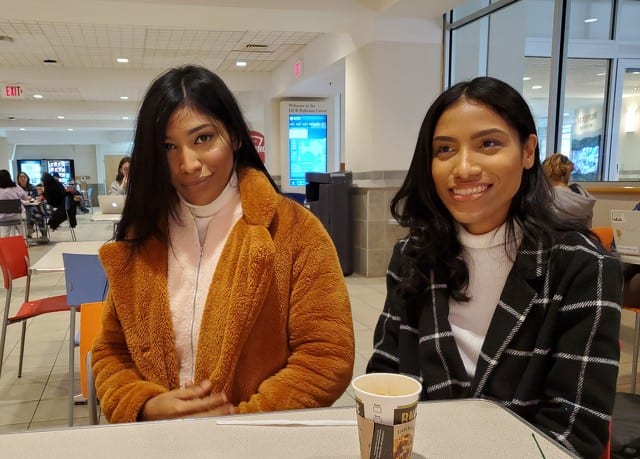It’s an unfortunate part of life in State College. Many of us townies have little chance to meet the talented young people who hang out on Penn State’s campus. And of course, the likelihood of encountering them is now lower than ever.
So that’s why it gives me such great pleasure to introduce you to a spectacular pair of young women who are pursuing master’s degrees at Penn State Law. They are twins, and both are intellectually brilliant, a fact that was underscored when each earned a prestigious Fulbright scholarship to study in America. Most importantly, both are passionate about opportunities to work for greater justice, equity and peace in their violence-torn nation of Colombia and especially for their ethnic group, the Afro-Colombian people.
What do you notice when you talk with Angelica and Indira Ricaurte Villalobos? First you see a warmth and kindness that points to their upbringing in a loving family and the special support they provide each other as twins. But later you observe an inner pain in both of them that motivates them to action.
A HAPPY CHILDHOOD?
As we sit down in a HUB eatery, it doesn’t take long for me to appreciate their two-peas-in-a-pod relationship. They platform each other’s perspectives, but they also interrupt each other. They praise each other generously, but they also hurl some sarcastic barbs. I’m pretty sure these womb-mates are going to compete for life’s very last jelly bean, but I’m just as sure they will always love each other fiercely. As Angelica says, “I don’t think that she’s a different person. I do feel she’s part of my soul.”
After the twinning thing has been revealed, a deeper factor displays itself. These women have felt their nation’s wounds since they were little girls, and they talk passionately about their pain. Of course, I already knew about Colombia’s decades of narco-terrorism, so I shouldn’t have been surprised. But still I am shocked to realize the terrifying realities a pair of little girls had to confront.
Indira begins by describing 20-year-old memories from when she and Angelica were in grade school.
“Imagine,” she says, “that 70 kilometers from our town, the paramilitaries, one of the most important army groups in Colombia, were killing people. And after that, they would play soccer with the heads of the people they killed.”
ONGOING VIOLENCE
Angelica updates her sister’s comments with a description of current life in the Caribbean region of Colombia.
“The armed conflict in Colombia,” she says, “is the oldest internal armed conflict in the Americas and we are still suffering the consequences of the war. It happened again a few weeks ago when there was another massacre in our hometown. I’ve been crying all morning (she’s crying as she speaks).”
The twins will never forget the time when unlawful behavior visited their own family. Says Indira, “Our father was kidnapped by the guerrilla group of the FARC (a Marxist-Leninist rebel group) when we were five years old. We were asking our mother, ‘Mom, when is our father coming home from work?’ We didn’t know what was happening. He did come home later, and eventually we learned that he was kidnapped that day.”
“And that is a normal situation,” says Angelica. “Most of our community has faced it. It happens all the time. It’s normal. More than 900 social leaders have been killed since the signing of the peace agreement between the government and the guerrillas of the FARC in 2016. Nine hundred!”
* * *
A pair of twin baby girls were welcomed into the world on October 12, 1991 by Jose Ricaurte and his wife, Alejandra Villalobos.They appeared to be identical, and genetic testing has since confirmed that fact. But both agree that their appearances have diverged in recent years. “She looks thinner than me,” says Indira in an objective tone. Angelica can’t resist a teasing reply and says, “More beautiful, obviously.”
Jose and Alejandra raised their daughters and an older son in Sincelejo, a city of 290,000 that is located just 30 kilometers from the Caribbean Sea. In some ways, the environment was idyllic. In others, not so much.
“The Caribbean coast of Colombia is one of the most beautiful places in the world,” says Indira. “Living along the Caribbean coast is just pure magic.” Adds Angelica, “When you grow up near the sea, you do not think that there are going to be any limits for you.”
Though near to the ocean, Sincelejo is located close to Los Montes de Maria, a mountainous area that contains a major drug route. Hence the violence within nearby communities.
Fortunately, Angelica and Indira were able to ignore the violence enough to enjoy a relatively normal teenage experience. But for identical twins, “normal” is a relative term. For example, both vividly recall their fiesta de quince años (similar to a debutante’s ball) which left one young man in a very confused and frustrated state. This boy was smitten with Angelica, and he was in the midst of declaring his romantic intensions when the young lady he was addressing said, “I’m not Angelica!”
How did Angelica react to this young man’s understandable yet unforgivable blunder? She struggles to translate her words into an appropriate teenage idiom and is happy when I suggest “Get lost!”

Indira (left) and Angelica Ricaurte Villalobos have brought a double portion of intellect and passion to their studies at Penn State Law.
ACADEMIC & PROFESSIONAL SUCCESS
After high school, Indira and Angelica made their way to the University of Cartagena, one of the strongest universities in northern Colombia. They lived together throughout their collegiate days and studied together.
In 2014, the two graduated from Cartagena in perfect twin fashion—an exact tie at the top of student rankings. Incredibly enough, both girls achieved a 4.44 average on a 5-point grading scale. To break the tie, faculty members offered subjective input and Indira was named valedictorian.
After graduation, the twins spent a year as interns in Tippecanoe County, Indiana before settling into jobs in Colombia. Both chose to pursue their passion for nonviolence and justice in their native land.
For Indira, that meant teaching human rights law and doing research on the assassinations of social leaders in Colombia’s rural regions. For Angelica, it led to several government jobs that involved protecting the rights of mistreated citizens. Most notably, she worked for one year as an advisor to the government of Sincelejo, and part of her role was to guarantee the security of former FARC rebels, the very group that had once kidnapped her father.
IDENTIFYING AS BLACK
Like many Colombians, the twins represent a melding of various ethnic groups. From a genetic perspective, they describe themselves as having a mixed-race identity of Black, Indigenous and Spanish. But from a cultural perspective, both emphasize their Black heritage. Although Indira is careful to acknowledge both her Indigenous and African roots, Angelica regards herself as 100 percent Black.
Angelica explains why. “I am completely Afro-Colombian,” she says. “Of course, there are people that are darker than me. But that’s not the way I look at it. It’s not the skin that I have on my body; it’s the way I recognize myself. In my country, we are facing a problem of discrimination. However, we are so proud of our African heritage that we can’t believe people still experience problems just because of the color of their skin.”
Both women point to the fact that a disproportionately high percentage of Afro-Colombians are being killed by the warring forces.
“In Bogota, the capital of Columbia, most people can be categorized as ‘criollo,’ which means they are Latin Americans who are of mostly Spanish descent,” notes Angelica. “They don’t experience the same intensity of conflict that the people in our city experience. They say it could be a coincidence, but we don’t think it’s a coincidence that so many Afro-Colombians are being killed.”
WHY PENN STATE?
As a pair of Fulbright scholarship holders, the Colombian twins certainly had opportunities to study at many U.S. institutions. Just off the top of her head, Indira mentions the University of Illinois, the University of Wisconsin and the University of Southern California among their options.
Initially, Indira and Angelica had planned to attend separate U.S. schools to continue their development as independent adults. But then COVID-19 became a factor and everything changed. Recalls Angelica, “We said, ‘Oh my God, we are facing a pandemic in the world. We need each other. We have to be closer.’”
Asked what guided their decision to Penn State, both ladies utter the same two words—“Stephen Barnes.” Barnes, as I reported in an August column, is an associate dean of Penn State Law who travels the world to recruit topflight international students. Both Colombians note the importance of meeting him in their homeland—but for different reasons.

Colombian twins Angelica (left) and Indira Ricaurte Villalobos are enjoying their Penn State experience.
A PERSONAL CONNECTION
For Indira, the personal connection to a university leader was important. As she says, “If you’re not having the best week, you can just go to the office of Dean Barnes, and he’s going to be there with a big smile and making sure you feel better than before. That means a lot to me. He is truly an angel.”
As for Angelica, she observes that there was no opportunity to meet deans from other law schools. So it was especially meaningful for her when she heard a crucial promise from Barnes. “He told me, ‘Angelica, if you are going to come to Penn State, you are not going to suffer from discrimination from the color of your skin or because you are a woman. If you come to Penn State, you are going to have a lot of opportunities.’ When he said that, I thought, ‘Oh my God, that’s what I wanted to hear.’”
Both young ladies are exceedingly happy in Happy Valley. They’ve found the people here to be friendly. They’ve settled into a new concentration at Penn State Law (“Race, Law and Equity”) that perfectly fits their interests. And they’re blown away by the natural beauty of the area. “It’s just amazing to be doing an assignment and go outside to look at the red leaves falling from the trees,” says Indira. “It’s just like a dream.”
PURPOSE & PASSION
Even with the drudgery of life under COVID, surely the month of May will arrive quickly and the two women will undoubtedly graduate with Master of Laws (LL.M.) degrees. What then? Neither seems precisely certain of future plans, but both are considering the eventual possibility of Ph.D. studies.
As for an ultimate life goal, Indira declares a passion for instilling one key value in the next generation of Colombians.
“I will be a liar if I say that I’m going to end the war,” she says. “But at least I hope that when I talk with my nephew, who is 10-years-old, and when I talk with my niece, who is 3-years-old, I can tell them, ‘Samuel, Sara, please have empathy.’ I hope that they see the other person as equal. I hope that they don’t judge the other person because of skin color. I hope they don’t judge the other person because of their broken English. I think all that this world needs is empathy.”
Angelica, meanwhile, wants to serve with the Colombian government and construct public policies to benefit the Afro-Colombian community and other ethnic groups.
“No matter our skin color, no matter our gender, we are human beings and deserve to be treated as human beings,” she says. “Martin Luther King said, ‘I have a dream,’ and that dream is still not achieved. We are fighting for that dream and we are going to die fighting for that dream because it’s not just about the two of us.”

Indira (left) and Angelica Ricaurte Villalobos discussed what led them to Penn State during a recent conversation at the HUB-Robeson Center.



